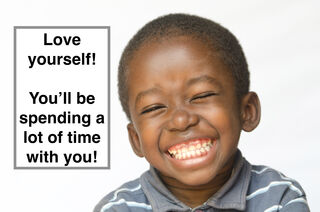Health
Simone Biles and Naomi Osaka: 4 Olympic-level Lessons
Mental health gold at the Tokyo games.
Posted July 28, 2021 Reviewed by Gary Drevitch

Simone Biles and Naomi Osaka both dropped out of Olympic competition this week, citing mental health reasons. Naomi Osaka also dropped out of the French Open earlier this year, and in an essay for Time, she wrote:
“Life is a journey…literally everyone either suffers from issues related to their mental health or knows someone who does…I think we can almost universally agree that each of us is a human being and subject to feelings and emotions.”
Here are four takeaways from this historic moment:
1. Anxiety is part of the human condition - and yet mental health issues are stigmatized.
I would be kidding myself if I said I could totally understood the pressures on these incredibly high-performing, world-class young women, particularly how they attract added scrutiny because of their racial and gender identities, but I can empathize. Anxiety itself is the most common mental health condition in the world. At least 30% of American adults experience a diagnosable anxiety disorder at some point in their lives, and almost everyone gets a dose of anxiety on their journeys. Anxiety is part of the human condition, particularly during this time of COVID. Broadly speaking, anxiety is tied to our human vulnerability: perceived survival and safety concerns for ourselves, or our loved ones, or threats to our principles, values, self-concept and sense of belonging. We need to normalize, not stigmatize, mental health conditions. We need to companion, not alienate, people who have mental health challenges.
2. Winning isn’t everything: Contingent self-esteem vs. self-compassion.
Being a gold-medal winner doesn’t guarantee happiness for the long-term. Self-esteem is tied to performance, achievements, status, beauty, wealth, etc., and thus is highly contingent. When we have what we want, we feel good, temporarily. But circumstances change, others outshine us, and we fall on hard times.
Self-compassion, on the other hand, doesn’t desert us when we fail — as self-esteem does. Research shows self-compassion provides a more stable sense of self-worth over time. Self-Compassion is also linked to less social comparison and less narcissism than self-esteem. This flies in the face of a typical modern ego identity, built around all those externalities. We have to actively cultivate self-compassion, as most people tend to be more compassionate to others than they are to themselves when they suffer.

Simone Biles and Naomi Osaka modeled the three components of self-compassion perfectly.
- Mindfulness – they noticed and named what they were feeling in their bodies and minds
- Common humanity – by not isolating themselves with their feelings, but by telling others, they demonstrated common humanity
- Self-kindness – in their moments of difficulty, they chose to be kind to themselves – instead of “gutting” or “gritting” it out.
With self-compassion, we can love and accept ourselves as we are, warts and all. This actually spurs us to greater achievements. An ancient proverb states “fall down 9 times get up 10” – self-compassion helps us keep getting up. Also, with a better relationship to ourselves, we can also enjoy better relationships with others – and the strength of our relationships is most fundamental to our long-term happiness, as the Harvard Grant study famously showed.
We are human BE-ings, not simply human DO-ings or HAVE-ings. We should value ourselves for be-ing. (You can find an MSC workshop through the Center for Mindful Self-Compassion. A 3-hour BIPOC retreat will be held on October 10, 2021.)
3. Knowing the difference between challenge and overwhelm zones.
All of us should make ourselves familiar with the Zones of Tolerance. We each have a zone of comfort and safety; a zone of growth and challenge; and a zone of overwhelm. We have to know where we are at any given time. Ideally, we can expand the first two zones and creatively work with overwhelm when we land in it, at least by naming it. Naming difficult emotions actually soothes our threat-sensitive amygdalae.

4. Interdependence: We all need each other.
On the surface, an Olympic-level tennis player or gymnast may seem to be the epitome of individualism and individual achievement. But all of us are intricately dependent on others. Simone Biles said that not having an audience at the Tokyo Olympics actually increased pressure! This warmed my heart and made me feel even more tender for Biles: how the energy of an audience may have lifted, focused, and energized her. The ripple of connection and support that buoys us to our greatest achievements cannot be underestimated. Moreover, it feels good to support people who mirror our best values back to us.
Naomi Osaka and Simone Biles have inspired millions with their impressive athletic talent as well as courage in standing up for vulnerable others: those who suffer with mental health challenges and all of us impacted by racial injustice.
The ripple of connection they have created by standing in their full humanity cannot be underestimated.
A deep bow of gratitude to both of these incredible teachers.
(c) 2021 Ravi Chandra, M.D., D.F.A.P.A.
References
Naomi Osaka: It’s OK to not be OK. Time, July 8, 2021
Grit: Is It Baloney? Psychology Today, Jun 22, 2016
Getting out of the Anxiety Trap: Make it RAIN! Psychology Today, Jan 31, 2012
Edwards C. Simone Biles Is Sending a Message: Olympians Are People First. Med Page Today, July 29, 2021
Thomas L. The Tokyo Olympics’ Indelible Moments of Loss and Solidarity. The New Yorker, August 8, 2021




